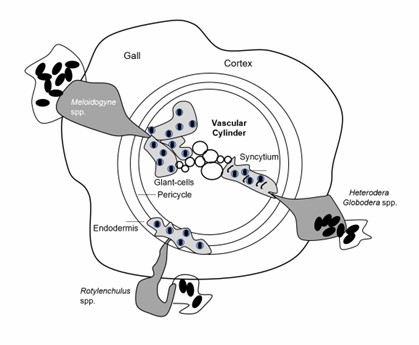Plant nematodes are one of the important pathogens causing plant diseases. They have the characteristics of long survival time, wide transmission routes, strong adaptability, and serious harm. During infection, plant nematodes secrete many proteins to the host body, which play a vital role in the invasion, establishment, and maintenance of feeding sites and host defense response. Such secreted proteins are called effector proteins.
Lifeasible provides services covering various mechanism analyses of effector proteins in plant nematodes to our customers worldwide. With extensive experience and expertise in plant science, we are committed to providing you with timely and high-quality deliverables.
 Fig.1 Feeding cells formed by sedentary plant nematodes.
Fig.1 Feeding cells formed by sedentary plant nematodes.
We provide mechanism analysis of posttranslational modification mediated by effector proteins, including phosphorylation, ubiquitination, glycosylation, proteolysis, and histone modification.
We help our customers analyze the mechanism of regulating plant hormones by effector proteins, such as auxin, cytokinin, salicylic acid, jasmonic acid, ethylene, and so on.
Lifeasible has been dedicated to planting science for many years. We'll finish your studies on time and within budget. We guarantee the confidentiality and sensitivity of our customer's data. If you are interested in our services or have any questions, please feel free to contact us or make an online inquiry.
Lifeasible has established a one-stop service platform for plants. In addition to obtaining customized solutions for plant genetic engineering, customers can also conduct follow-up analysis and research on plants through our analysis platform. The analytical services we provide include but are not limited to the following:
Get Latest Lifeasible News and Updates Directly to Your Inbox
Adaptive Evolutionary Mechanism of Plants
February 28, 2025
Unraveling Cotton Development: Insights from Multi-Omics Studies
February 27, 2025